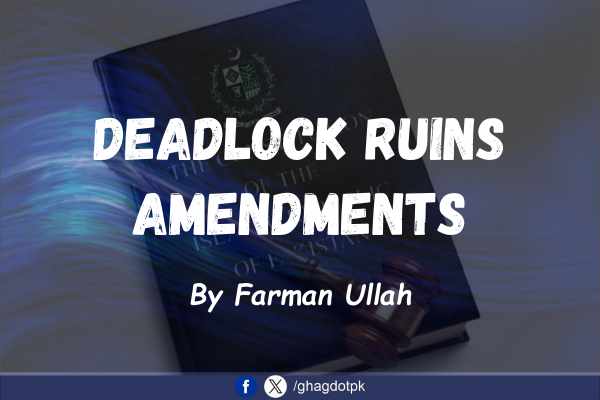By Farman Ullah
PML(N) coalition government put off presenting a contentious constitutional amendment bill in parliament due to insufficient votes to pass it.
What are the proposed constitutional amendments?
The proposed legislation is being done in the “broader public interest” to provide swift and affordable justice.
The government aims to introduce a bill related to judicial reforms in the National Assembly. The reforms include amendments in the judiciary, speedy disposal of pending cases, and appointments in the higher judiciary, including the Chief Justice.
According to reports, the constitutional amendment bill includes 54 proposals, such as amending Article 63-A to count votes cast by parliament members against their party’s directions. The bill also proposes establishing a constitutional court to handle constitutional matters exclusively.
Additionally, the bill suggests changes to the parliamentary committee’s formation for judge appointments and the Supreme Judicial Council. It is said that the Prime Minister will recommend the first Chief Justice of the Constitutional Court, while future appointments will be made by a committee of three judges.
Incompetency of the Government
Senator Faisal Vawda has described the government as incompetent and ineffective.
In an informal discussion with the media on Monday, he expressed dissatisfaction with the government’s inability to pass the constitutional amendment, despite two days of efforts, raising questions about its performance.
When asked about the failure to pass the amendment, Vawda remarked that such results were expected from a government that lacked competence.
He also pointed out that many government members were trying to evade responsibilities, urging the media to question them.
Vawda hinted at giving his analysis and prediction soon, claiming that significant changes in the government were imminent.
Who is responsible?
Pakistan’s government has hit a roadblock in passing its proposed constitutional amendments. The bill, which aims to provide swift and affordable justice, was delayed due to a lack of required numbers to pass it in the parliament.
The government needs 224 votes in the National Assembly and 64 in the Senate to pass the amendment, but its current coalition strength is 214 in the NA and 52 in the Senate. The Jamiat Ulema-i-Islam (JUI-F), with eight NA members and five senators, holds significant sway in the outcome.
The Trust Deficit
The trust deficit among the coalition government of the Pakistan Muslim League (N) is a pressing concern. Historically, PML-N has faced challenges in maintaining trust within its coalitions, largely due to its complex relationships with other parties and the military. The party’s dominance in coalitions has sometimes led to resentment among smaller parties, creating tensions and mistrust. For instance, during the 1990 general elections, PML-N was part of the eight-party Islamic Democratic Alliance (IDA), which had contained the right-wing conservative mass as one entity against the left-wing circles, led by the Pakistan People’s Party (PPP).
Divergent ideologies and power struggles have also contributed to the trust deficit.






